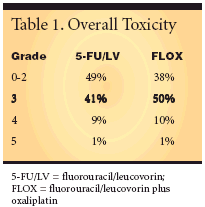5-FU/Leucovorin Plus Oxaliplatin Significantly Improves Disease- Free Survival in Colorectal Ca Pts
ORLANDO-The additionof oxaliplatin (Eloxatin) to weekly bolusfluorouracil/leucovorin (5-FU/LV)
ORLANDO-The additionof oxaliplatin (Eloxatin) to weekly bolusfluorouracil/leucovorin (5-FU/LV)significantly improves 3-year diseasefreesurvival in patients with stage IIand III colon cancer, according toNorman Wolmark, MD, of AlleghenyGeneral Hospital in Pittsburgh. Dr.Wolmark presented the results of theNational Surgical Adjuvant Breast andBowel Project (NSABP) study C-07(abstract 3500).The 3-year disease free-survival ratewas 71.6% for those patients receiving5-FU/LV alone and 76.5% for thosereceiving 5-FU/LV plus oxaliplatin(FLOX). "This translates into an overall21% risk reduction," Dr. Wolmarkreported. Disease-free survival was theprimary study endpoint."The data confirm and extend theresults of the MOSAIC trial," Dr. Wolmarksaid. The MOSAIC (MulticenterInternational Study of Oxaliplatin/FU-LV in the Adjuvant Treatment ofColon Cancer) trial has a 3-year disease-free survival rate of 77.9% andwas updated at ASCO 2005 by Aimeryde Gramont, MD (see page 5).In a press conference earlier at theASCO meeting, Dr. Wolmark said theresults of the C-07 trial were "superimposable"on the MOSAIC trial andthat patients should not be denied thebenefits of oxaliplatin. In commentsafter the press conference, he said thathe was optimistic that the 3-year resultsfor C-07 would translate into 5-year results.

Neurotoxicity Most Troubling"The overall toxicity was greaterfor the FLOX arm, but not that muchgreater," Dr. Wolmark reported. Grade0 to 2 toxicities occurred in 49% of the5-FU/LV arm and in 38% of the FLOXarm, but grade 3 toxicities were higherin the FLOX arm (50% vs 41% in the5-FU/LV arm; Table 1)."The most troubling toxicity relatedto oxaliplatin was neurotoxicity,"Dr. Wolmark said. In the FLOX arm,85.4% of patients had some degree ofneurotoxicty during treatment, althoughthis rate dropped to 29.4% ofpatients at 12 months after treatmentstopped. Grade 3 neurotoxicity occurredin 8.5% of patients in the FLOXarm during treatment and 0.5% ofpatients at 12 months after treatmentstopped.These percentages for neurotoxicitywere lower in the C-07 study thanin the MOSAIC trial, "perhaps becausewe used a lower cumulative doseof oxaliplatin," Dr. Wolmark said. TheC-07 trial protocol stipulated a cumulativedose of 765 mg/m2 and theMOSAIC trial, 1,020 mg/m2. Overall,73% of patients in the C-07 trial receivedthe protocol-stipulated dose."The only unanticipated toxicitythat we saw was a form of transmuralenterocolitis requiring hospitalizationand rehydration," Dr. Wolmark reported.This event occurred in 34 patients(2.7%) in the 5-FU/LV arm andin 56 patients (4.5%) in the FLOXarm.There were 14 deaths in the 5-FU/LV arm and 15 deaths in the FLOXarm.'Monotonously WellDistributed' PatientCharacteristicsPatients with stage II (28.6%) orstage III colon cancer were randomizedto receive either 5-FU/LV (5-FU:500 mg/m2 IV bolus weekly; leucovorin:500 mg/m2 IV weekly for 6 weeks ofthe 8-week cycle, repeated three times)or FLOX (the same 5-FU/LV regimenplus oxaliplatin [85 mg/m2 IV] onweeks 1, 3, and 6 of each 8-week cycle,repeated three times)."The data support the use of weeklybolus 5-FU/LV in combination withoxaliplatin in adjuvant colon cancer,"Dr. Wolmark concluded."Patient characteristics were monotonouslywell distributed for sex,age, tumor location, and above allnumber of nodes, which was not par-ticularly surprising since the trial wasstratified based on the number of positivenodes," Dr. Wolmark said. About29% of patients in both arms had nopositive nodes, 45% had one to threepositive nodes, and 25% had morethan three positive nodes. Slightlymore than half of the patients in eacharm were < 60 years old.